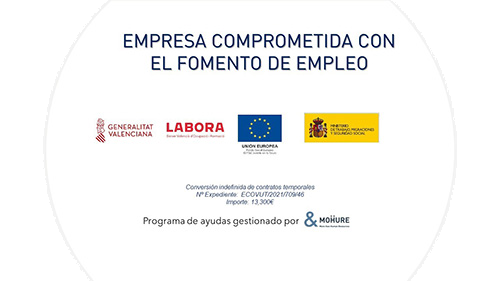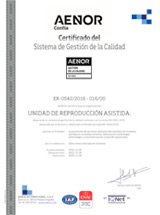Age is a vital factor in the ovarian reserve. The quantity and quality of the eggs decreases irreversibly throughout the life, which determines their fertility. At an older age, the number of eggs that can be fertilized is lower and the quality of the eggs
 Women today tend to delay their motherhood due to sociocultural aspects, such as the development of their careers, work obligations or the search for partners, which increase the risk of infertility. In addition medical aspects, due to the appearance of certain types of cancers in younger and younger women, due to the side effects that some surgical or pharmacological treatments have on fertility.
Women today tend to delay their motherhood due to sociocultural aspects, such as the development of their careers, work obligations or the search for partners, which increase the risk of infertility. In addition medical aspects, due to the appearance of certain types of cancers in younger and younger women, due to the side effects that some surgical or pharmacological treatments have on fertility.
“The professionals of Gynecology and Reproduction can respond to this problem by making women aware of the importance of preserving their fertility. Today it is possible and simple thanks to the vitrification of a quantity of quality eggs that are produced in fertile age, so that they can be fertilized in the moment in which the decision of being a mother is made and then avoiding the problems of infertility ” , Says Dr. José Jesús López Gálvez, director of the Reproduction Unit of the Clínica HLA Vistahermosa.
The specialist advises that “the woman who wants to be a mother, but decides to delay her motherhood beyond the age of 35, should perform a simple study of her ovarian reserve and know the greater or lesser follicular endowment of her ovaries. This is a very important parameter from a reproductive point of view, since it is a quantitative concept that correlates with the quality of the available follicles and oocytes. ”
What is the ovarian reserve?
The ovarian reserve the number of follicles in the ovary at any given time. The amount of resting ovarian follicles that the fetus has in the 5th month of intrauterine development is the one that will condition the ovarian response that we have subsequently. Women start from a number close to 10 million before birth. At birth, the number has dropped to about 1.5 million and falls to less than a third at the time of the first menstruation. By age 35-37, the ovarian reserve is about 25,000 follicles. The number of follicles we started with and the rate at which these are reduced is variable and not the same in all women. In addition to age, other factors such as surgeries, chemotherapeutic or toxic  treatments such as tobacco, contribute to make this decrease faster and more marked. The decrease of the ovarian reserve is a physiological process, continuous and irreversible and presents a great variability. For this reason, the availability of ovarian reserve markers will help the gynecologist to know the status of each woman at a given time.
treatments such as tobacco, contribute to make this decrease faster and more marked. The decrease of the ovarian reserve is a physiological process, continuous and irreversible and presents a great variability. For this reason, the availability of ovarian reserve markers will help the gynecologist to know the status of each woman at a given time.
“When we start a reproductive treatment we need an evaluation of the ovarian function to estimate the chances of getting a pregnancy based on whether the ovarian reserve is low or normal and to be able to advise our patients about their reproductive situation. In this way we can offer more individualized treatments and administer the precise doses in each case, “says Carmen Avilés, gynecologist at the Reproduction Unit Vistahermosa.
Ovarian reserve markers
 According to Dr. Avilés, among the ovarian reserve markers we have: the antral follicles count, which is performed with a simple, highly reliable test consisting of a vaginal ultrasound; Determination of the hormone Antimulleriana (AMH), and determination of follicle stimulating hormone (FSH), both involved in the development of follicle maturation in the ovary.
According to Dr. Avilés, among the ovarian reserve markers we have: the antral follicles count, which is performed with a simple, highly reliable test consisting of a vaginal ultrasound; Determination of the hormone Antimulleriana (AMH), and determination of follicle stimulating hormone (FSH), both involved in the development of follicle maturation in the ovary.
“Knowing at an early age the capacity of ovarian reserve allows to preserve quality eggs that have the maximum probabilities of being fertilized in the future, and be biological mother of their children. In many cases it is late and the woman has to resort to ovodonación to get a pregnancy “, the gynecologist incurs.
What is the best age for an ovarian reserve test?
“The best age is as soon as possible”, points out the specialist of the Reproduction Unit Vistahermosa. “It is necessary to take into account that from the 35 years the ovarian reserve and the quality of the ovules are reduced considerably.










